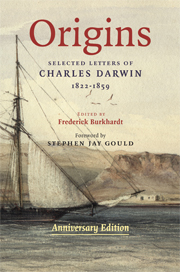Book contents
- Frontmatter
- Contents
- Foreword by Stephen Jay Gould
- Introduction
- Note on the Text
- Acknowledgments
- Symbols and Abbreviations
- Prologue
- Shrewsbury
- Edinburgh
- Cambridge
- The Offer
- The Voyage: South America – East Coast
- The Voyage: South America – West Coast
- Homeward Bound
- 1837
- 1838
- 1839–1843
- 1844
- 1845–1846
- 1847
- 1848
- 1849
- 1850
- 1851
- 1852–1854
- 1855
- 1856
- 1857
- 1858
- 1859
- Biographical Register
- Bibliography of Biographical Sources
- Bibliographical Note
- Further Reading
- Index
Foreword by Stephen Jay Gould
Published online by Cambridge University Press: 15 April 2010
- Frontmatter
- Contents
- Foreword by Stephen Jay Gould
- Introduction
- Note on the Text
- Acknowledgments
- Symbols and Abbreviations
- Prologue
- Shrewsbury
- Edinburgh
- Cambridge
- The Offer
- The Voyage: South America – East Coast
- The Voyage: South America – West Coast
- Homeward Bound
- 1837
- 1838
- 1839–1843
- 1844
- 1845–1846
- 1847
- 1848
- 1849
- 1850
- 1851
- 1852–1854
- 1855
- 1856
- 1857
- 1858
- 1859
- Biographical Register
- Bibliography of Biographical Sources
- Bibliographical Note
- Further Reading
- Index
Summary
This book should be viewed as an intense drama of a particular kind, and in an honored genre. Epistolary books do not appeal to everyone (though they rank among my personal favorites), but stories told as letters form an ancient and popular tradition from St Paul onward. Epistolary non-fiction embodies the added virtue of an actual life, as told (however truly, and whatever hidden) by the protagonist.
Many historians have lamented the decline of letters written on preservable paper as a frightful loss to the trade. Modern technology has placed us in a paradoxical situation. We usually assume that information becomes richer as we approach the present day — for more kinds of records ought to become available, and less deterioration and loss should occur. But we now send most of our communiqués but once over a telephone wire into permanent oblivion, and many (if not most) of our letters now exist only in the cyberspace of e-mail and other similar devices (where they may, of course, be transferred to paper, but will just as likely be dumped into a lost realm with our phone calls).
Charles Darwin's life (1809–1882) falls squarely into an intermediary time of maximal information — after an older time of too much information lost (and no adequate postal service), and before our modern age of electronic obliteration.
- Type
- Chapter
- Information
- OriginsSelected Letters of Charles Darwin, 1822–1859. Anniversary edition., pp. ix - xxPublisher: Cambridge University PressPrint publication year: 2008
- 2
- Cited by



